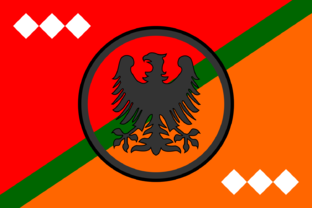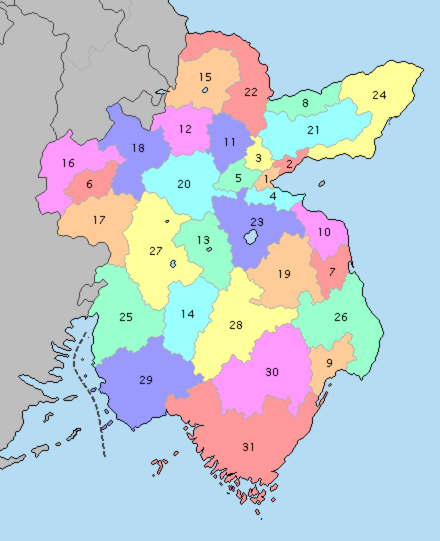Solea
The Socialist Autarky of Solea (Auxiliary Soleani: zekáhi zoletha apa) /sɤlɛʔa/ is a sparsely populated socialist constitutional e-democratic republic located on the continent of Amalthea. It is a founding member of the Free Federation. At the last census in 983, Solea had a population of just over 12.6 million humans and saguans. Solea is an extremely environmentalist and autarkic nation, rejecting capitalist-imperialist views of civilization. Domestic policy focuses on preservation of the environment for the benefit of all life, sustainability, and eco-friendly industry. In addition, Solea is home to over 200 designated national parks and vast wildlife sanctuaries where settlement is extremely limited.
The country has no form of currency. The economy of Solea relies instead on a federal rations system in which an individual carries a card or personal electronic device (called a <>) to track the individual's allowance for necessities and luxuries. The rationing is based on recent production and availability within the nation and is frequently updated with the internal flow of goods. Any citizen of Solea may move freely within the Free Federation at their own request. Immigration and travel are tightly regulated from other regions to preserve the low population, though the restrictions are more relaxed for residents of the Free Federation.
Lysteriokans first made contact with the nation of Solea in <>, when Aeridanish explorers tried to set up colonies and mercantilist trading settlements, leading to decades of skirmishes with the Empire of Aeridani (and to a lesser extent Aiyota) and the city-state of Zapfna.
Contents
Etymology
The name Solea derives from the name of the river zolekh which runs through the Soleani capital city Zeilunavkw.
The spelling is a matter of debate among linguistic scholars. During the Soleani romanization was updated during the <> century, spellings of place names were preserved. Some linguists find it overdue to update the spelling of the nation in international contexts to zoletha, while others think it would be too prescriptivist to force an orthography in addition to causing far different approximations of the name rendered by foreign speakers unfamiliar with Standard Soleani.
History
In -293 the Empire of Nausikkak dissolved into three nations, Blaist Blaland, Darvincia, and Solea. After the uniting force was removed, the tribes of Solea quickly fell into a state of disorder. For several hundred years the tribes formed confederations which conquered and waned with time. By 250, several major powers established themselves and expansion of the major nations slowed. In 307, the Proclamation of the Soleani Tribal Confederation was declared among several of the major powers and over the next decades integration reunifed the tribes under one central government. In 515, the Tribal Confederation proclaimed itself a socialist autarky under the Nature of Government, a document based on the ideals of Blaist Communism.
Geography
The landscape of Solea is dominated by a prominent mountain range stretching north-south across the majority of the eastern part of the country, including a large plateau/highlands at the northernmost section which is in turn connected to an extension of the mountain range to the north and west into Eksola and Auspikitan. A major river system flows through the largest and capital city Saelunavvk out into the Serkr Ocean. The Aolejk Peninsula is for the most part extremely flat, except for a range of small mountains on the southern side.
Demographics
The Soleani people are mostly composed of native tribes that originated from the region east of the mountains and living along the Solekh, but has in recent years experienced high rates of immigration from overseas.
Government
Further information: Government of Solea
The government is a hybrid of several ideas, with the purpose of creating a system of checks and balances for most effective governing while protecting the interests of the people.
Administrative Divisions
| 1 | seilunavkw | 7 | tapasi | 13 | etskáş | 19 | paeŋ | 25 | kareŋ | 31 | fykisel |
|---|---|---|---|---|---|---|---|---|---|---|---|
| 2 | 8 | norluk | 14 | 20 | lahathwpúv | 26 | eqiri | ||||
| 3 | 9 | 15 | itilsekk | 21 | 27 | episwa | |||||
| 4 | vithpa | 10 | sevák | 16 | qespoşan | 22 | itigenepik | 28 | kavlsŋtše | ||
| 5 | aqeztn | 11 | kutapi | 17 | luteipuwa | 23 | atwa kahe | 29 | tilyvem | ||
| 6 | ihpkalik | 12 | ekewanet | 18 | kitak | 24 | athola | 30 | othavenevk |
Provinces are numbered by area.
Economy
solea could have like a huge recycling and re-use industry and stuff
Culture
The culture of Solea is unusually traditional, that is, clinging to the religious-based festivals and rituals, compared to the prevalence of religion in the country, which is extremely low. According to census data from 612, only a little more than 3% of the population still "believed in (a) higher power(s)" or held "other spiritual beliefs." In contrast, over three-fourths of the population (extrapolated from the 7000 surveyed) reported that they attended a local festival in the past year, according to a study conducted by the National Sociological Institute of Saelunavvk.
Most national festivals and holidays stem from original Soleani mythology, celebrating various things.
The culture of Solea is also highly nature-based, as evidenced by their mythology, practices, and society.
Health and Education
Solea has a nationalized healthcare system that is free for any citizen of the country. Yearly examinations and check-ups are mandatory for all Soleani citizens to ensure proper care and warning time concerning any serious health conditions.
Tourism
Solea is a highly popular ecotourism spot due to the government's strict protection of the environment and careful extraction and preservation of natural resources. Individuals wishing to travel to Solea can easily apply for a travel visa, but the government highly restricts who can enter due to the low native population, placing priority on those with relatives and family in Solea. In addition, Soleani law restricts the government from dealing with private tourism companies from other countries.
Sports
Common international sports include football and archery.
Dolphin and auto racing are also very popular in Solea. Several racetracks and cetaceadromes have been constructed in Solea for the hosting of several international events.

